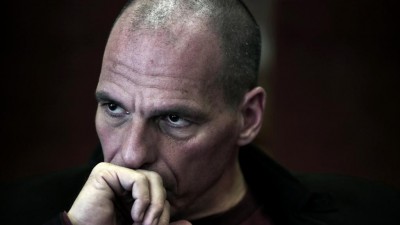Warrior Economist: The Varoufakis Legacy

“And I shall wear the creditors’ loathing with pride.” Yanis Varoufakis, Jul 6, 2015
It was always going to be difficult for Greece’s Yanis Varoufakis to remain in his post after Sunday’s victory for the Syriza coalition. Seemingly playing his own variant of game theory, Varoufakis got what he wanted: a resounding rejection of the bailout-austerity terms by sovereign will. Even in the flush of triumph, its value was always going to be tempered by casualties. Such have been the costly spoils of economic war.
When the choking dust settles on this European tragedy, finance minister Varoufakis will remain one of its great, if not notorious figures displayed in historical big print. He proved aggressive and flinty in his confrontation. His fellow finance ministers squirmed under his lecturing barrage on debt relief and renegotiated terms with the Troika. “They are unanimous in their hate for me – and I welcome their hatred.”
But the Varoufakis style singes and burns. It does not abide much short of getting the goods. It is individual – notably, he remained outside Syriza’s membership during his time in office. He keeps shirts untucked for battle. He doesn’t wear ties. Nothing additional needed when the pugilists come out to play.
The German media was immediately taken by Greece’s new warrior economist, falling for the flamboyance. He became the “Bruce Willis” of financial negotiations, after a ZDF news anchor could not resist the comparison as he stormily held the fort against the creditor’s clutches. “Varoufakis is without doubt a man full of charisma,” claimed the swooning Marietta Slomka. “Visually, he is someone you could imagine starring in a film like ‘Die Hard 6’ – he’s an interesting character.”
Stern magazine decided to recall the precedents of antiquity, seeing the finance minister as a figure transmogrified into marble. “He rattles around Athens on a big, black mortorcycle, never tucks his shirts in and radiates a sort of classical masculinity that you usually see in Greek statues.”
Die Welt decided to run with “What makes Yanis Varoufakis a sex icon.” There was a certain tabloid tone, pondering that “balding head, cool style and muscular Yamaha motorcycle.” Debt negotiations had ceased to be dull. While having not succeeded in forcing “any creditors to their knees,” the economics academic “is shaking up the suits in Europe with a casual appearance and cool stare.”[1]
In June, his startling manner, part bouncer, part buccaneer, was visibly agitating colleagues on his side of the anti-austerity fence. The crisis, more than ever, was showing that Greece was not an island, and even Syriza’s grouping was wondering whether this, by implication, was what Varoufakis was seeking. Could Greece be free within Europe, or out of it?
Certainly, Varoufakis used all the images of war and terror appropriate for Greece’s appalling predicament. Prior to Sunday’s vote, his comments on economic terrorism on the part of the creditors cut to the bone. On receiving the referendum results, he colourfully penned that the referendum “will stay in history as a unique moment when a small European nation rose up against debt-bondage.”
The parallel currency option was certainly suggesting that the EU yolk had to be thrown off. This was the language of serfdom and acute bondage. To save Europe, Athens would have to effectively walk away.
Varoufakis’ writings show a preoccupation with the theme of Europe as a modern market disease. The European Union, as he argued in the New York-based art magazine Brooklyn Rail, had become the great commodifier of culture, utilising the tools of the Single Market and bureaucracy.[2] “For three decades now exchange value has been wiping the floor clean with any other form of value”.
The public sphere had been retreating for years; the demos was falling silent even as the market was roaring with savage confidence. Territorial borders are terrifying; but not having citizen participation to tame economic forces is even more so. In 1978, when France’s Valéry Giscard D’Estaing and Germany’s Helmut Schmidt contemplated a common monetary system before the remains of Charlemagne, totemic figure of European unity, they were engaging in an act of “euro-kitsch ‘pilgrimage’”. Less than four decades later, Europe was effectively “divided by a common currency.”
With the No vote victory, it was time for Alexis Tsipras to get down to the tables and do more talking. This meant removing the weapon that was Varoufakis. (For some months, he had actually been concealed from finance meetings to avoid further excitement.) To make a deal, few expected it to happen with the strident economist in the room. The revolver had to be put away.
“Soon after the announcement of the referendum results, I was made aware of a certain preference by some Eurogroup participants [eurozone finance ministers], and assorted ‘partners’, for my… ‘absence’ from its meetings; an idea that the prime minister judged to be potentially helpful to him in reaching an agreement. For this reason I am leaving the Ministry of Finance today.”[3]
As he slums on the back benches, gazing at the arena of combat, Greece’s financial system is starved of funds; chronic shortages are manifesting themselves across the economy; and some of Europe’s finance ministers are pondering life after a potential exit. A “proper resolution” now will have to involve “debt restructuring, less austerity, redistribution in favour of the needy, and real reforms.”
No one familiar with this episode will forget that Varoufakis was the child of a crisis born from a failure. Instead of settling for the wet hen, as Soviet Premier Nikita Khrushchev explained on the art of compromise in 1958, he never gave up seeking the bird of paradise.
Dr. Binoy Kampmark was a Commonwealth Scholar at Selwyn College, Cambridge. He lectures at RMIT University, Melbourne. Email:[email protected]
Notes
[1] http://www.reuters.com/
[2] http://yanisvaroufakis.eu/

